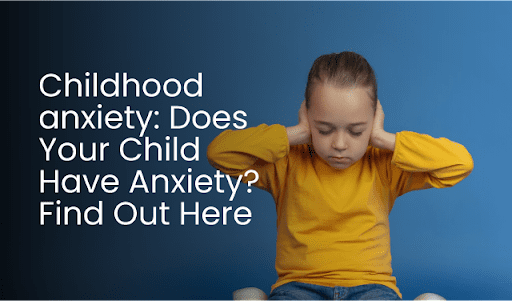Early diagnosis and getting help can alleviate the problem if your child has childhood anxiety. Learn all about the early symptoms here. However, it can be difficult for some children to cope with this crippling anxiety.
What are the Early Symptoms of Childhood Anxiety?
Anxiety is a normal part of growing up. But occasional nervousness or worrying is part of everyday life for many children and teens [1]. But if your child has difficulty coping with worries or fears, they may suffer from an anxiety disorder.
Childhood anxiety symptoms can vary greatly depending on the type of anxiety disorder your child has developed and other factors such as age and gender. Early intervention can make a big difference in managing childhood anxiety.
Here are some other early warning signs to look out for:
- Your child is constantly worrying or fretting about something.
- Your child is easily upset.
- Lack of social skills in your child
- Fearfulness or anxiety when faced with new experiences or situations
- Difficulty sleeping and staying asleep for several nights in a row
- Your child is always seeking reassurance from adults
- Panic attacks or panic attacks triggered by specific situations
- Your child refuses to go to school or participate in activities with other kids
- Frequent complaints about stomach pains or headaches
- Tense muscles and twitches in the face or hands
What are the Reasons for Childhood Anxiety?
Anxiety is a normal emotion that everyone experiences at some point in their lives. However, anxiety can be more than just a fleeting feeling for some children, it can be a chronic and debilitating condition that affects their daily lives.
There are many reasons why children may experience anxiety. Some children are born with a predisposition to worry, while others may develop it in response to trauma or stress. Whatever the cause, pressure can profoundly affect a child’s life.
Anxiety can make it hard for children to focus at school, make friends, or even leave the house. Sometimes, it can lead to self-destructive behaviours such as cutting or substance abuse.
If your child is struggling with anxiety, it is essential to seek help from a mental health professional. Your child can learn to manage stress and lead a happy and productive life with treatment.
Suppose you notice any of these early signs of anxiety in your child. In that case, it’s essential to talk to a doctor or mental health professional to get a proper diagnosis and treatment plan.
How to Overcome Early Symptoms of Childhood Anxiety?
When you have a child, it can be hard to understand what they are going through. You want to bring them up healthily, but you also want them to enjoy life and feel comfortable with themselves. To help you with that, here are some tips on how to help your child overcome early symptoms of childhood anxiety:

-
Teach them coping skills:
The first thing you should do when your child shows signs of anxiety is to teach them coping skills. These skills include relaxation techniques like deep breathing exercises, mindfulness meditation, training, and eating healthy foods. It would be best to teach them how to deal with their emotions and keep themselves occupied so they don’t get overwhelmed by worries about school or social situations.
-
Encourage playtime for kids:
Kids with anxiety often feel more comfortable playing with other children who don’t judge them or ask questions about their feelings. So encourage them to play with friends outside of school if possible! Start with family playtime if your child doesn’t feel comfortable making friends outside of school because they fear being judged.
-
Seek Professional Help:
Is nothing helping with your child’s anxiety? It must be due to underlying issues such as past trauma, bullying, etc. With professional help and therapy, your child can learn to cope with anxiety. United We Care is an online mental health platform that provides professional support to assess and manage various mental health disorders, including childhood anxiety. Click here to learn more about U.W.C. and its services.
Conclusion
Childhood anxiety is a condition that most children experience between 2 and 5 years. It is often an intense feeling of worry, fear, or stress that can affect a child’s behaviour and mood. It can affect anyone, but some people are at higher risk than others.
Kids who have a family history of depression or have been diagnosed with a learning disability may be more likely to develop childhood anxiety. But being overweight, having low self-esteem, or having other mental health problems can also increase your child’s risk for developing childhood anxiety.
Children with childhood anxiety may not talk about their symptoms because they fear it will make them appear weak or silly. They may also feel anxious about being seen by others as having a problem with their emotions or behaviour. If you are concerned about your child’s behaviour, seek professional help from a specialist who can offer advice and support to help your child manage their condition.
| [1] | E. K. Freidl, O. M. Stroeh, R. M. Elkins, E. Steinberg, A. M. Albano, and M. Rynn, “Assessment and treatment of anxiety among children and adolescents,” Focus (Am. Psychiatr. Publ.), vol. 15, no. 2, pp. 144–156, 2017. |
| [2] | P. M. Barrett, “Treatment of childhood anxiety,” Clin. Psychol. Rev., vol. 20, no. 4, pp. 479–494, 2000. |





